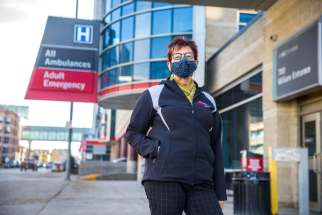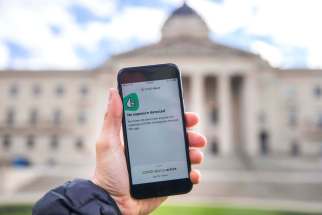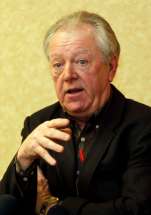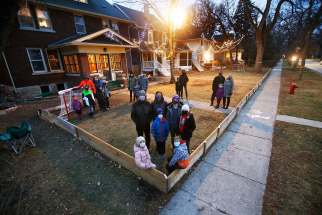Mixed messaging a ‘dangerous’ combination Unclear communication surrounding province's COVID-19 orders 'undermines everything,' prof says
Read this article for free:
or
Already have an account? Log in here »
To continue reading, please subscribe:
Monthly Digital Subscription
$0 for the first 4 weeks*
- Enjoy unlimited reading on winnipegfreepress.com
- Read the E-Edition, our digital replica newspaper
- Access News Break, our award-winning app
- Play interactive puzzles
*No charge for 4 weeks then price increases to the regular rate of $19.00 plus GST every four weeks. Offer available to new and qualified returning subscribers only. Cancel any time.
Monthly Digital Subscription
$4.75/week*
- Enjoy unlimited reading on winnipegfreepress.com
- Read the E-Edition, our digital replica newspaper
- Access News Break, our award-winning app
- Play interactive puzzles
*Billed as $19 plus GST every four weeks. Cancel any time.
To continue reading, please subscribe:
Add Free Press access to your Brandon Sun subscription for only an additional
$1 for the first 4 weeks*
*Your next subscription payment will increase by $1.00 and you will be charged $16.99 plus GST for four weeks. After four weeks, your payment will increase to $23.99 plus GST every four weeks.
Read unlimited articles for free today:
or
Already have an account? Log in here »
Hey there, time traveller!
This article was published 12/11/2020 (1853 days ago), so information in it may no longer be current.
The confusion surrounding COVID-19 orders was apparent in Manitoba almost four weeks ago, when Winnipeggers were hit with an array of restrictions designed to curb the already alarming spread of the virus in the city.
Families missed funerals they could have attended. Religious gatherings were held, even as faith leaders were unclear if they were breaking the law. Winnipeg hotel bars avoided closure just hours before a public health order was to take effect.
Then, on Wednesday evening, confusion reared its ugly head again.
Just a day before, Dr. Brent Roussin, Manitoba’s chief public health officer, and Premier Brian Pallister announced the entire province would be placed under a code-red lockdown. The message from them appeared clear: no social gatherings at all. Household contacts only.
But when Roussin’s order was released, it specifically allowed for as many as five visitors to a household at a time.
Roussin said Thursday a blunt, no-visit order would require numerous exceptions, and feared the media were distracting from the key takeaway: stay home.
Yet it’s this kind of mixed messaging that experts fear is distracting Manitobans from doing the right thing.
“Unclear communication undermines everything. It makes people just kind of adopt their own logic, their own way of making decisions — and sometimes those decisions are really dangerous,” said Colin Furness, an epidemiologist and information-management professor at the University of Toronto.
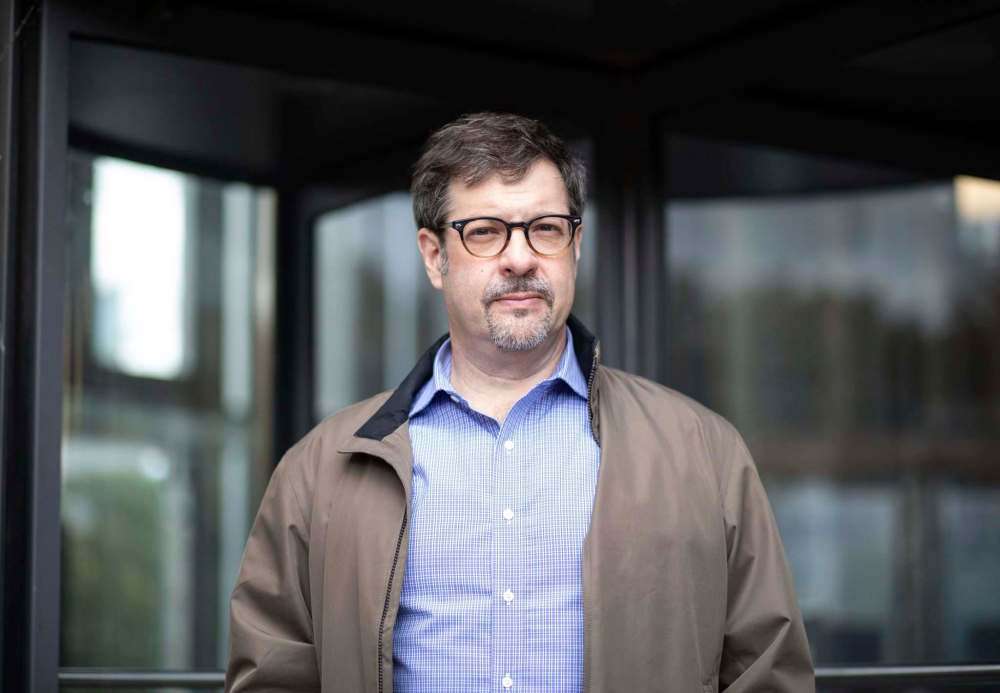
Furness noted that science continues to evolve, meaning public-health experts have had to change their COVID-19 messaging around masks, aerosols and presymptomatic spread.
That makes it even more important to be clear about what we do know.
“What we call ‘COVID fatigue’… results from a bit of learned helplessness, like the idea that we can’t make sense of these messages; they’re conflicting, they’re internally inconsistent,” Furness said.
That was the case Thursday, when neither the provincial government nor Roussin would concede that the order directly contradicted Tuesday’s messaging that all household visits were banned, and not just discouraged or limited.
“Unclear communication undermines everything. It makes people just kind of adopt their own logic, their own way of making decisions– and sometimes those decisions are really dangerous.”
–Colin Furness, epidemiologist and information-management professor at the University of Toronto
“The narrative here is that we’re at a critical point in Manitoba; our hospitals are nearing capacity. We right now need to stay home,” Roussin told reporters Thursday.
The previous evening, the Pallister government decried journalists as “irresponsible” for pointing out the discrepancy, while PC MLA James Teitsma took to Facebook to point out that allowing people to visit households is necessary for babysitters, home care and bringing grandma to the doctor.
University of Manitoba health professor Michelle Driedger said that message could have been part of Roussin’s original remarks on Tuesday.
“If it had that kind of clarity and that boundedness, that probably would have been more helpful than making the statement on Tuesday that nobody outside your household should be in your house,” she said.
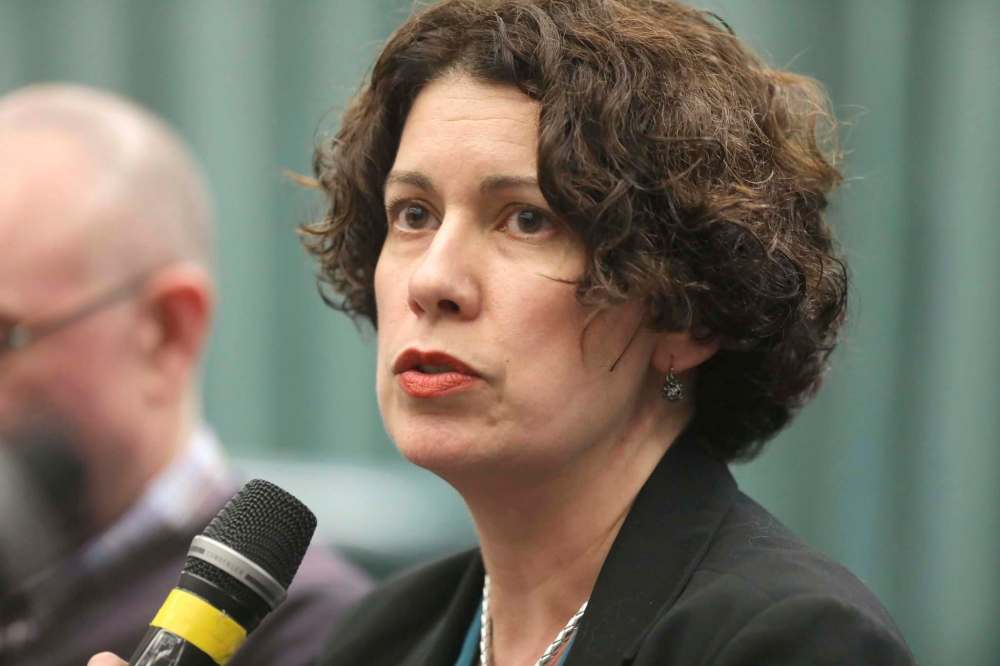
Driedger argued this can be done “in language that’s sufficiently flexible, so you don’t have to think of absolutely every possible combination or permutation that would be deemed reasonable.”
Furness said all public-health experts are under immense pressure during the second wave, especially in Manitoba with some of Canada’s worst coronavirus figures.
“He sounds stressed out,” Furness said of Roussin. “At the same time, he’s got to be clear, and it doesn’t sound like he was as clear as he ought to have been, and I think that’s a problem.”
Last week, religious leaders told the Free Press they were unsure what services had been banned in the Winnipeg region.
“The narrative here is that we’re at a critical point in Manitoba; our hospitals are nearing capacity. We right now need to stay home.”
– Dr. Brent Roussin
A 45-minute chat with a provincial minister still left them unclear about which events qualified as religious activities and which were outright banned, such as Sunday school, faith workshops and prayer meetings.
Mercifully, the entire province entering code red on Thursday inadvertently kiboshed all religious services, providing blanket clarity.
Now, clergy and musicians can only gather in groups of five or less for the purposes of recording or livestreaming services.
On Oct. 19, the province made a last-minute reversal on its order to close Winnipeg bars, instead carving out an exemption for hotel beverage rooms.
The hotel association told its members that this was the result of its lobbying and media outreach.
“He sounds stressed out. At the same time, he’s got to be clear, and it doesn’t sound like he was as clear as he ought to have been, and I think that’s a problem.”
– Colin Furness on Dr. Brent Roussin’s latest directive
A day later, the province suggested it changed course three days after issuing its notice of closures, because hotel bars have mostly been acting as restaurants.
That modification for hotel bars delayed Winnipeg’s red-zone restriction by 23 hours, but the province didn’t publish any notice of this online.
As a result, the funeral industry told its members to cap attendance at five guests, leading to at least one family needlessly halving the number of relatives attending a service.
Furness and Driedger both said public-health officials should share information that helps people understand what’s being asked of them, and why.
“When you’re being transparent you also have a real duty of care to be clear, and to not leave things open to misinterpretation,” Furness said.
Driedger added it might confuse Manitobans to hear the premier continually talk about boosting enforcement over people not respecting the rules, while Roussin asserts that Manitobans have tended to follow his advice without it being legally mandated.
“It doesn’t seem like he is in complete control over the messaging around the public-health guidance,” Driedger said of Roussin.
dylan.robertson@freepress.mb.ca

